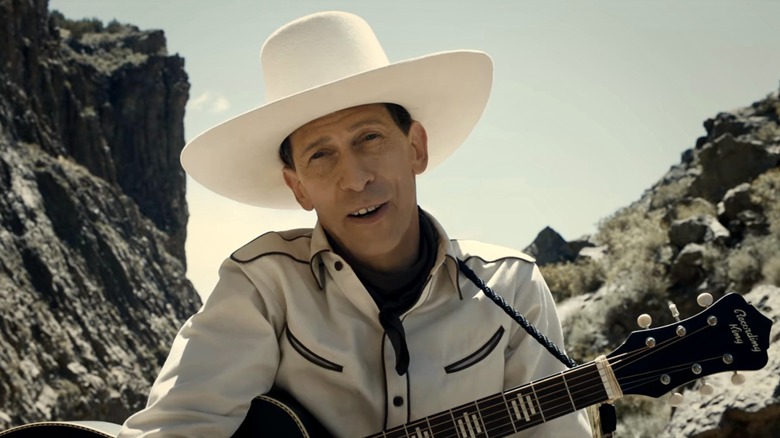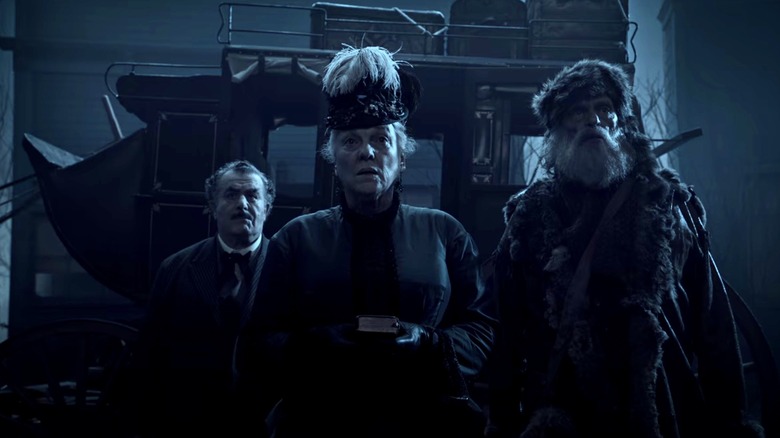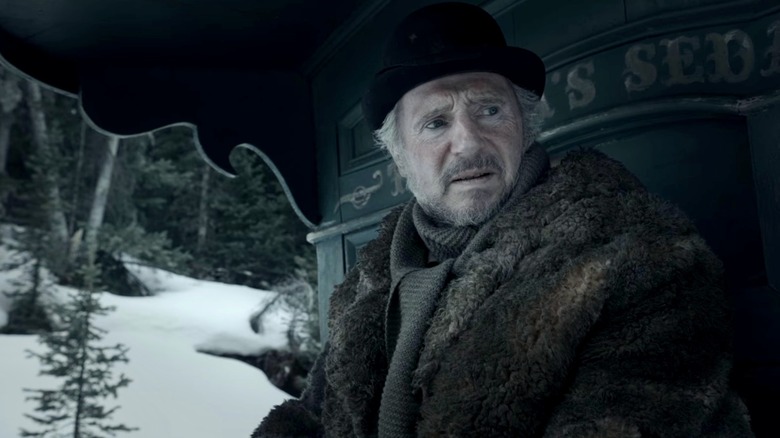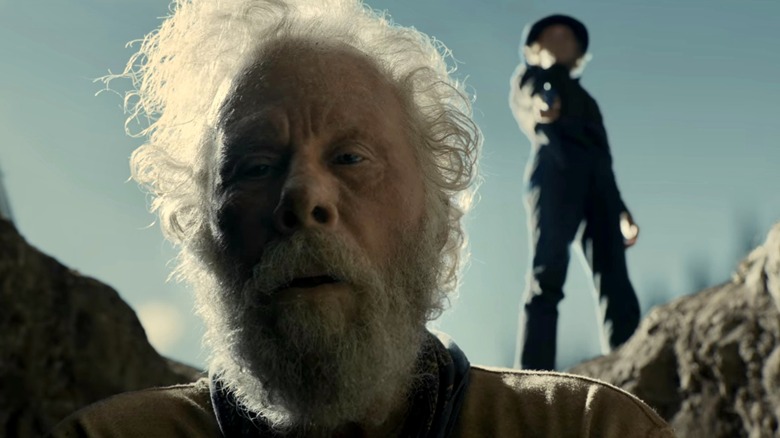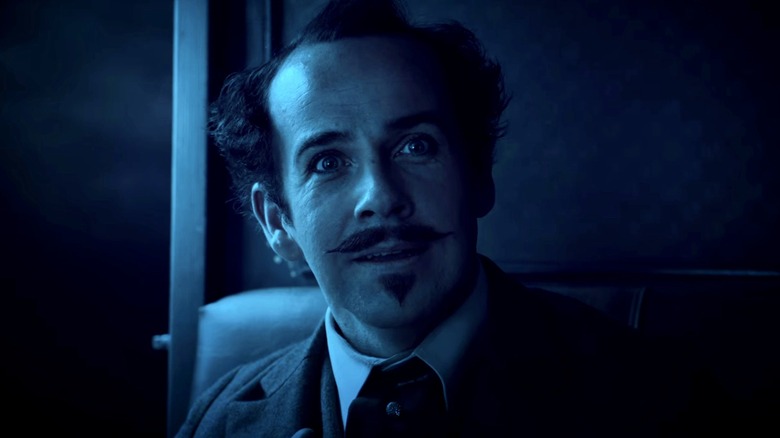The Daily Stream: The Ballad Of Buster Scruggs Offers Six Coen Brother Stories About One Thing
(Welcome to The Daily Stream, an ongoing series in which the /Film team shares what they've been watching, why it's worth checking out, and where you can stream it.)
The Movie: "The Ballad of Buster Scruggs"
Where You Can Stream It: Netflix
The Pitch: In addition to being the final Coen Brothers film (for now, at least), "The Ballad of Buster Scruggs" is the most charming anthology Western about death you're ever likely to see. It's not only about death, but the specter of human mortality looms over all six segments of this film, which unfolds like a collection of short stories, complete with an actual book and the turning of pages onscreen.
In each story, a character meets their match in some way, whether it be through a musically inclined gunslinger or a math-inclined chicken. The sum total is a masterful, Oscar-nominated anthology where each tale holds its own pleasures yet also anchors the central theme of life's transience and glory's impermanence.
The Coen Brothers made movies together for over thirty years, beginning with "Blood Simple" in 1984, but "The Ballad of Buster Scruggs" is their last one together. It saw them shooting on digital for the first time and embracing the streaming model before Joel went solo this year with "The Tragedy of Macbeth" (co-starring his wife, Frances McDormand) and Ethan started working on his upcoming "lesbian road trip" movie (co-written with his wife and frequent film editor, Tricia Cooke).
For all we know, this may end up being the last entry in the Coens' shared filmography. If true, that would certainly gel with the idea of the fleeting nature of things here on earth, be it a life, a career, or a wagon tour through the American frontier with a "celebrated thespian, orator, and popular entertainer."
Why it's essential viewing
Like "Kwaidan," the six tales in "The Ballad of Buster Scruggs" each feature the same directorial and writerly voice (though "All Gold Canyon" and "The Girl Who Got Rattled," are based on a Jack London and Stewart Edward White story, respectively, which is why the Coens as a team received a Best Adapted Screenplay nomination for the film at the 91st Academy Awards). This helps give the movie a tonal consistency and unity of vision that makes it less hit-or-miss than most anthology films.
The title story allows us to hear the self-described "pleasing baritone" of Tim Blake Nelson again, as we did in "O Brother, Where Art Thou?" His singing cowboy, Buster Scruggs, accrues many nicknames and epithets, including "The Misanthrope" and "Herald of Demise," but for him, the preferred nomenclature is the "San Saba Songbird." Buster's outwardly genial nature belies a tendency to shoot dead any darn saloon patron who would dare to challenge him, and then break out in song about it. By way of a countdown, he even blasts off one guy's fingers like five little piggies going to the meat market.
Note that Buster comes trotting into the movie as a rider on a pale horse, like Death. "I gotta set myself up in the undertaking business," he jokes. He's quicker on the draw than anyone and seems downright invincible until he meets the Kid (Willie Watson of Old Crow Medicine Show) and realizes, "You can't be top dog forever." There's no greater moment than when their duel in the street tips over into the "Yippie-ki-yi-yay" chorus of the out-of-body duet, "When a Cowboy Trades His Spurs for Wings." It's a wicked intro that sets up the whole rest of the anthology and its themes.
Near Algodones and Meal Ticket
The Coen Brothers have long employed gallows humor in their films, but "The Ballad of Buster Scruggs" gives them the chance to do it literally as one character faces the hangman's noose. In "Near Algodones," a Cowboy and would-be bank robber (James Franco) runs afoul of an especially well-prepared Teller (Stephen Root), only to find himself strung up by the neck by a posse that is likewise outmatched against Comanche arrows.
The Cowboy cheats death once, but can he do it twice? This chapter and others also show how the Coens, unlike the Nihilists in "The Big Lebowski," still vouchsafe a glimmer of hope for some doomed protagonists, whether it be a place in the clouds or the face of a pretty girl.
"Meal Ticket" is less merciful in its examination of the relationship between art and commerce, as embodied by the Artist (Harry Melling) and his Impresario (Liam Neeson). Keeping in mind Joel's recent "Macbeth" adaptation, it's easy to see the Artist as the chair-bound personification of the Scottish King's idea that life is but "a poor player that struts and frets his hour upon the stage, and then is heard no more."
Though his stage career falls into the same cyclical routines as anyone's daily life, the Artist pours his heart out on stage in his orations. Yet it's no coincidence they begin with Percy Bysshe Shelley's "Ozymandias," a poem about how the legacy of even the mightiest kings falls by the wayside. This only adds irony to him ending his recitations with a line from the Gettysburg Address about a government that "shall not perish from the earth." Show business, like the dirty game of politics and life itself, is always looking for the next big thing.
All Gold Canyon and The Gal Who Got Rattled
"All Gold Canyon" serves as a Tom Waits showcase, as his tenacious Prospector (and occasional egg thief) digs up a beautiful green valley, filling it with holes so he can locate a pocket of gold. The deeper he digs, the more in danger he is of landing in his own grave right when he's on the cusp of achieving his goal.
There's a shot in this segment (see above) that somewhat recalls one in "No Country for Old Men" where a menacing figure appears out of focus over the Prospector's shoulder. In this case, however, the positions are inverted, and his would-be gold (and life) usurper has the high ground.
"The Ballad of Buster Scruggs" is even-handed in mingling character actors with established stars, and "The Gal Who Got Rattled" is just one of the vignettes that demonstrates that. It makes a prairie love triangle out of a wagon train leader (Bill Heck), his taciturn partner (Grainger Hines), and the frontierswoman and potential wife (Zoe Kazan) who comes between them. Characters convey an aching vulnerability and humility in the face of uncertainty about "that which we can see and touch." Like true pioneers, they're resilient through hardship, but the title of this one says it all.
The Mortal Remains
The final story, "The Mortal Remains," puts Saul Rubinek, Tyne Daly, and an unrecognizable Chelcie Ross on the stagecoach to a gloomy "fort" that could just be code for kingdom come. On the way there, they argue about "moral and spiritual hygiene" and whether people are like ferrets. "No Country for Old Men" (specifically, its existential coin toss) is again echoed in the line, "How a man wager[s], it is decided by who he is, by the entirety of his relation to poker, right up until the moment of that bet."
The other two passengers are "reapers" and bounty hunters, an Irishman (Brendan Gleeson) and an Englishman with a devil beard (Jonjo O'Neill). As the sun goes down, the moonlit Englishman leers right at the viewer, similar to Buster, talking about how they nab people when they're distracted and he likes "looking into their eyes as they try to make sense of it." Suddenly, he's confronting the audience with their own creeping mortality, saying:
"They connect the stories to themselves, I suppose. And we all love hearing about ourselves, so long as the people in the stories are us, but not us. Not us in the end, especially. The midnight caller gets him, never me. I'll live forever."
The midnight caller gets us all. Yet there may be a light at the end of the staircase. If you're looking for some filmic nourishment, a movie for "the betterment of your soul," as one character puts it, "The Ballad of Buster Scruggs" meets the afterlife with a song in its heart and it's weirdly comforting in its insistence that all things shall pass.
